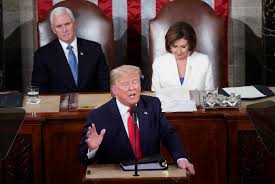By Jacob Pramuk, Thomas Franck, CNBC–
- President Donald Trump said he instructed his administration’s negotiators to stop coronavirus stimulus negotiations with Democrats until after the Nov. 3 election.
- House Speaker Nancy Pelosi and Treasury Secretary Steven Mnuchin had talked in recent days as they pushed to strike a relief deal.
- The economy is still struggling under the weight of coronavirus-related shutdowns as millions of Americans have not returned to work.
President Donald Trump said Tuesday he has told his administration’s negotiators to end coronavirus stimulus talks with Democrats until after the Nov. 3 election.
The declaration, if the White House follows through on it, would halt an ongoing push to send trillions of dollars more in relief to Americans as the outbreak rampages through the U.S. and the economy struggles to recover from virus-related shutdowns. Treasury Secretary Steven Mnuchin and House Speaker Nancy Pelosi spoke for an hour about a relief package on Monday and planned to talk again Tuesday. Trump had only three days ago urged the sides to complete a deal.
The president added that he has asked Senate Majority Leader Mitch McConnell to “focus full time” on confirming Supreme Court nominee Amy Coney Barrett. Trump spoke with Republican congressional leaders about stimulus plans earlier in the day.
In a statement responding to Trump’s tweets, Pelosi said Trump “showed his true colors: putting himself first at the expense of the country, with the full complicity of the GOP Members of Congress.” She added that “walking away from coronavirus talks demonstrates that President Trump is unwilling to crush the virus.”
Investors punished stocks in response to Trump’s tweets. The Dow Jones Industrial Average fell by more than 300 points, about 1.1%, in the minutes following the announcement.
Though talks had made little progress for months, traders had grown more hopeful that the sides could reach a deal before the election as many individuals and businesses struggle during the ongoing outbreak.
In his tweets Tuesday, Trump appeared to argue the U.S. economy does not need any more stimulus. He wrote that “we are leading the World in Economic Recovery, and THE BEST IS YET TO COME!”
While the U.S. quickly regained many of the jobs lost earlier this year, a weaker than expected nonfarm payroll gain of 661,000 in September fueled more concerns about the U.S. economic recovery slowing. The unemployment rate came in at 7.9%, still significantly higher than before the pandemic hit.
Trump’s push to stop negotiations came only hours after Federal Reserve Chair Jerome Powell urged Congress to approve more fiscal stimulus. He said a lack of sustained support from the federal government could “lead to a weak recovery, creating unnecessary hardship for households and businesses.”
The president decided to pull away from negotiations only weeks before an election in which his struggle to contain the virus outbreak and curb the economic damage from it have harmed his chances of winning a second term in the White House. Former Vice President Joe Biden, who has supported more stimulus, has criticized the president for failing to limit the economic destruction caused by the coronavirus.
Jared Bernstein, a former economic advisor to Biden and an informal advisor to his presidential campaign, criticized the president for postponing the talks.
“With literally millions of people facing hunger and evictions, and with job growth downshifting, this is no time for the president to stop negotiating,” he said. “His lack of leadership throughout the process has been and continues to be a huge stumbling block.”
Democrats and the Trump administration had struggled to agree on what provisions a fifth aid package would include and how much the proposal would cost. Democrats passed a $2.2 trillion relief bill last week, while Republicans had offered a $1.6 trillion package.
Democratic leaders repeatedly argued the GOP did not recognize the gravity of the crisis. Republicans, who grew wary of spending federal money, insisted Democrats proposed an unnecessarily expensive plan that embraced liberal priorities unrelated to the pandemic.
The sides appeared to have agreed on a range of relief provisions, including another $1,200 direct payments to most Americans, funds for a second round of small business loans, money for schools and $25 billion to help cover airline payrolls as companies plan tens of thousands of furloughs. But the GOP and Democrats failed to overcome fundamental disputes about several other issues.


Leave A Comment
You must be logged in to post a comment.